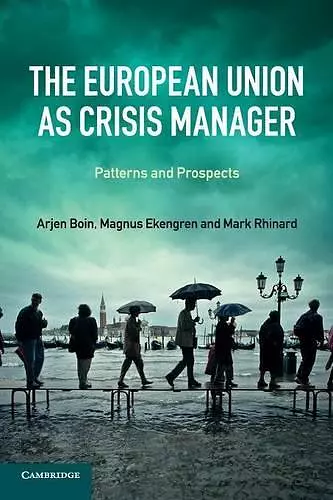The European Union as Crisis Manager
Patterns and Prospects
Magnus Ekengren author Mark Rhinard author Arjen Boin author
Format:Paperback
Publisher:Cambridge University Press
Published:8th Aug '13
Currently unavailable, and unfortunately no date known when it will be back
This paperback is available in another edition too:
- Hardback£75.00(9781107035799)

This book provides a unique and comprehensive overview of the European Union's many crisis management capacities and explains their origins.
The European Union is increasingly active as a crisis manager - from terrorist attacks to financial collapse; from natural disasters to cyber threats - but little is known about the EU's capacities. This book maps and assesses these capacities, explaining how they evolved and how they work.The European Union is increasingly being asked to manage crises inside and outside the Union. From terrorist attacks to financial crises, and natural disasters to international conflicts, many crises today generate pressures to collaborate across geographical and functional boundaries. What capacities does the EU have to manage such crises? Why and how have these capacities evolved? How do they work and are they effective? This book offers an holistic perspective on EU crisis management. It defines the crisis concept broadly and examines EU capacities across policy sectors, institutions and agencies. The authors describe the full range of EU crisis management capacities that can be used for internal and external crises. Using an institutionalization perspective, they explain how these different capacities evolved and have become institutionalized. This highly accessible volume illuminates a rarely examined and increasingly important area of European cooperation.
'This insightful book explains the unexpected rise of the European Union as a crisis manager and the strengths and limitations of its current crisis management capabilities. The product of an unusually fruitful collaboration between scholars of crisis management, European integration and international security, the book frames an important debate about the EU's present and future role in managing crises. European leaders will ignore this book at their peril!' Chris Ansell, University of California, Berkeley
'Boin, Ekengren and Rhinard have provided a penetrating, comprehensive and seminal analysis of a hitherto neglected subject area. It is a must-read for all those interested in the burgeoning field of European civil protection and will set the tone of the research agenda on this subject for many years to come.' Emil J. Kirchner, Jean Monnet Professor, University of Essex
'This book breaks new ground. Empirically, it shows the full range of European-level capabilities related to dealing with unexpected, extreme events turning into political crises. Analytically, it draws on an institutional approach to explain those evolving capabilities. It introduces the novel notion of the 'transboundary' crisis, the most difficult to cope with and to recover from. Scholars, policymakers and journalists will find this academically rigorous but accessible book essential for understanding an increasingly vital dimension of European integration.' Bengt Sundelius, Uppsala University, and Strategic Advisor to the Director General of the Swedish Civil Contingencies Agency
'… this volume presents an affordable contemporary overview of the EU's crisis management capacities, the findings of which can be further extended to studies of international relations and organizations. In addition, being rather descriptive in its analysis, this book serves as a perfect 'background story' for starting more detailed research for each domain of the EU's crisis management, employing certain data as a starting point for future case studies.' Nataliya Gudz, Journal of Contemporary European Studies
ISBN: 9781107680289
Dimensions: 229mm x 152mm x 11mm
Weight: 340g
206 pages